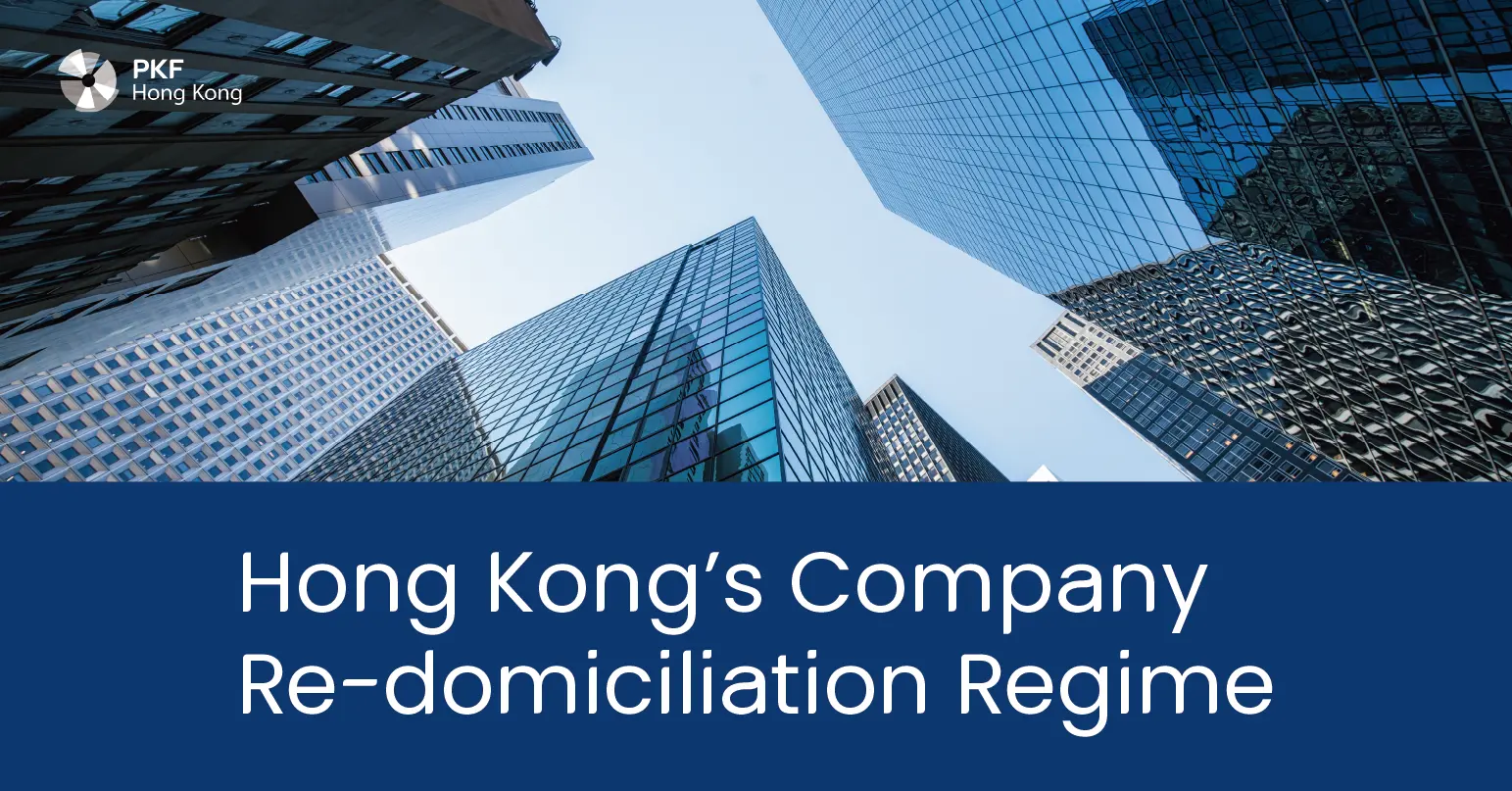Hong Kong’s Company Re-domiciliation Regime

Background
To strengthen Hong Kong’s position as a global business and financial hub, the Government of the Hong Kong SAR introduced an inward company re-domiciliation regime (hereinafter referred to as “the New Regime”) which allows companies domiciled outside Hong Kong to relocate their legal domicile to Hong Kong without creating a new legal entity. The New Regime preserves corporate identity, maintains continuity of business operations and provides access to Hong Kong’s business-friendly environment and robust legal framework.
The Companies (Amendment) (No. 2) Ordinance 2025, gazetted and enacted on 23 May 2025, amends the Hong Kong Companies Ordinance (Cap. 622) and related laws, including the Hong Kong Inland Revenue Ordinance (“the IRO”), to implement the New Regime.
Tax implications for re-domiciled companies
Hong Kong’s tax system has long adopted the territorial source principle, meaning that profits tax liability does not depend on the taxpayer’s residence or domicile. The basic charge to Hong Kong profits tax is contained in Section 14 of the IRO, which provides that any persons (including companies, regardless of their place of incorporation or tax residence) carrying on any trade, profession or business in Hong Kong are chargeable to tax on all profits (excluding profits arising from the sale of capital assets) arising in or derived from Hong Kong from such trade, profession or business.
If a non-Hong Kong incorporated company has carried on a trade, profession or business in Hong Kong before re-domiciling to Hong Kong, and has derived profits chargeable to Hong Kong profits tax from such trade, profession or business prior to its re-domiciliation, it will be subject to profits tax on those profits. Re-domiciliation does not relieve the company of its profits tax liabilities in respect of the period before re-domiciliation. However, if a non-Hong Kong incorporated company has never carried on any trade, profession or business in Hong Kong before re-domiciling, no profits tax will be charged on the profits earned by the company for the period before it commences business in Hong Kong.
Under the New Regime, companies that have undergone re-domiciliation will be treated as Hong Kong-incorporated entities and can benefit from Hong Kong’s simple tax regime. They will also be able to enjoy the tax benefits arising from Hong Kong’s extensive network of comprehensive avoidance of double taxation agreements or arrangements (“CDTA”). After providing proof of deregistration from its original jurisdiction, a re-domiciled company can apply to the Hong Kong Inland Revenue Department for the issuance of a Hong Kong Certificate of Resident Status. This certificate is generally a prerequisite for a company to access double taxation reliefs under the CDTAs. However, it should be noted that the preferential tax treatments under CDTAs require recognition by the partner jurisdictions and are subject to anti-abuse provisions, such as “beneficial ownership” and “principal purpose” tests.
The re-domiciliation process itself does not give rise to Hong Kong stamp duty, but any transfer of shares in a re-domiciled company after the re-domiciliation is subject to stamp duty or may qualify for exemption under the law.
Transitional tax arrangements
The New Regime also provides transitional tax arrangements for deducting expenses, claiming depreciation allowances for machinery or plant, and other related provisions.
For companies that carry on a trade or business in Hong Kong after re-domiciliation, expenses such as patent rights, capital assets and trading stock are deductible based on the lower of their actual cost (minus amortization) or their market value at the time of re-domiciliation. Depreciation allowances for plant and machinery follow the same basis, while the tax basis for trading stock is determined by its market value at the time of re-domiciliation.
Unilateral tax credit
If a re-domiciled company has paid foreign tax of substantially the same nature as Hong Kong profits tax on unrealized income or profits in its original jurisdiction of incorporation due to re-domiciliation, and after re-domiciliation, Hong Kong profits tax is also payable on the actual income or profits derived by the re-domiciled company, the re-domiciled company may apply for unilateral tax credit with the Hong Kong Inland Revenue Department in the year of re-domiciliation or relevant subsequent tax years to avoid double taxation. The tax credit is capped at the lower of the Hong Kong profits tax payable on the actual income or profits and the foreign tax paid on the same amount of income or profits, and any excess foreign tax paid beyond this cap may be allowed as a deduction in calculating the re-domiciled company’s assessable profits for Hong Kong profits tax purposes.
PKF Comment
The New Regime will reinforce Hong Kong’s status as a global business hub by providing a robust legal framework that enables non-Hong Kong companies to relocate their domicile to Hong Kong while maintaining their corporate identity and operations. Foreign companies seeking to re-domicile to Hong Kong should first understand the complexities of Hong Kong tax implications before applying for re-domiciliation to optimize tax outcomes and ensure compliance.
Contact us
PKF consists of over 400 offices, operating in 150 countries across five regions. We specialize in providing high quality audit, accounting, tax, and business advisory solutions to international and domestic organizations in all our markets.
PKF Tax and Business Advisory provides a wide range of comprehensive tax advisory services in respect of international, Hong Kong and China matters.
If you require assistance in any compliance or advisory matters, please feel free to contact our teams.

